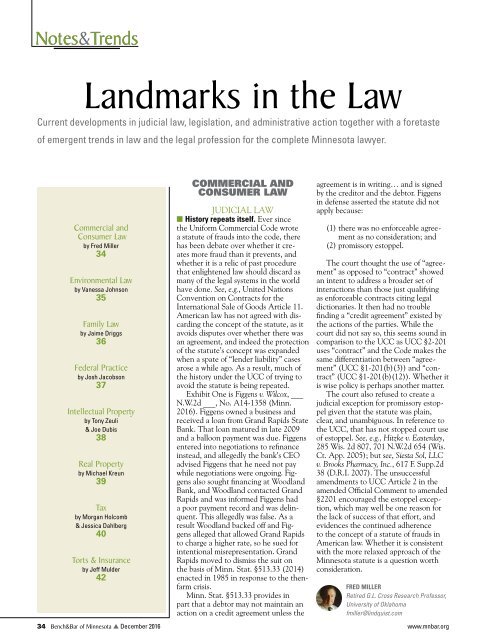FRESH LOOK PROBLEM UNPUBLISHED OPINIONS
xqHSYP
xqHSYP
You also want an ePaper? Increase the reach of your titles
YUMPU automatically turns print PDFs into web optimized ePapers that Google loves.
Notes&Trends<br />
Landmarks in the Law<br />
Current developments in judicial law, legislation, and administrative action together with a foretaste<br />
of emergent trends in law and the legal profession for the complete Minnesota lawyer.<br />
Commercial and<br />
Consumer Law<br />
by Fred Miller<br />
34<br />
Environmental Law<br />
by Vanessa Johnson<br />
35<br />
Family Law<br />
by Jaime Driggs<br />
36<br />
Federal Practice<br />
by Josh Jacobson<br />
37<br />
Intellectual Property<br />
by Tony Zeuli<br />
& Joe Dubis<br />
38<br />
Real Property<br />
by Michael Kreun<br />
39<br />
Tax<br />
by Morgan Holcomb<br />
& Jessica Dahlberg<br />
40<br />
Torts & Insurance<br />
by Jeff Mulder<br />
42<br />
COMMERCIAL AND<br />
CONSUMER LAW<br />
JUDICIAL LAW<br />
n History repeats itself. Ever since<br />
the Uniform Commercial Code wrote<br />
a statute of frauds into the code, there<br />
has been debate over whether it creates<br />
more fraud than it prevents, and<br />
whether it is a relic of past procedure<br />
that enlightened law should discard as<br />
many of the legal systems in the world<br />
have done. See, e.g., United Nations<br />
Convention on Contracts for the<br />
International Sale of Goods Article 11.<br />
American law has not agreed with discarding<br />
the concept of the statute, as it<br />
avoids disputes over whether there was<br />
an agreement, and indeed the protection<br />
of the statute’s concept was expanded<br />
when a spate of “lender liability” cases<br />
arose a while ago. As a result, much of<br />
the history under the UCC of trying to<br />
avoid the statute is being repeated.<br />
Exhibit One is Figgens v. Wilcox, ___<br />
N.W.2d ___, No. A14-1358 (Minn.<br />
2016). Figgens owned a business and<br />
received a loan from Grand Rapids State<br />
Bank. That loan matured in late 2009<br />
and a balloon payment was due. Figgens<br />
entered into negotiations to refinance<br />
instead, and allegedly the bank’s CEO<br />
advised Figgens that he need not pay<br />
while negotiations were ongoing. Figgens<br />
also sought financing at Woodland<br />
Bank, and Woodland contacted Grand<br />
Rapids and was informed Figgens had<br />
a poor payment record and was delinquent.<br />
This allegedly was false. As a<br />
result Woodland backed off and Figgens<br />
alleged that allowed Grand Rapids<br />
to charge a higher rate, so he sued for<br />
intentional misrepresentation. Grand<br />
Rapids moved to dismiss the suit on<br />
the basis of Minn. Stat. §513.33 (2014)<br />
enacted in 1985 in response to the thenfarm<br />
crisis.<br />
Minn. Stat. §513.33 provides in<br />
part that a debtor may not maintain an<br />
action on a credit agreement unless the<br />
agreement is in writing… and is signed<br />
by the creditor and the debtor. Figgens<br />
in defense asserted the statute did not<br />
apply because:<br />
(1) there was no enforceable agreement<br />
as no consideration; and<br />
(2) promissory estoppel.<br />
The court thought the use of “agreement”<br />
as opposed to “contract” showed<br />
an intent to address a broader set of<br />
interactions than those just qualifying<br />
as enforceable contracts citing legal<br />
dictionaries. It then had no trouble<br />
finding a “credit agreement” existed by<br />
the actions of the parties. While the<br />
court did not say so, this seems sound in<br />
comparison to the UCC as UCC §2-201<br />
uses “contract” and the Code makes the<br />
same differentiation between “agreement”<br />
(UCC §1-201(b)(3)) and “contract”<br />
(UCC §1-201(b)(12)). Whether it<br />
is wise policy is perhaps another matter.<br />
The court also refused to create a<br />
judicial exception for promissory estoppel<br />
given that the statute was plain,<br />
clear, and unambiguous. In reference to<br />
the UCC, that has not stopped court use<br />
of estoppel. See, e.g., Hitzke v. Easterday,<br />
285 Wis. 2d 807, 701 N.W.2d 654 (Wis.<br />
Ct. App. 2005); but see, Siesta Sol, LLC<br />
v. Brooks Pharmacy, Inc., 617 F. Supp.2d<br />
38 (D.R.I. 2007). The unsuccessful<br />
amendments to UCC Article 2 in the<br />
amended Official Comment to amended<br />
§2201 encouraged the estoppel exception,<br />
which may well be one reason for<br />
the lack of success of that effort, and<br />
evidences the continued adherence<br />
to the concept of a statute of frauds in<br />
American law. Whether it is consistent<br />
with the more relaxed approach of the<br />
Minnesota statute is a question worth<br />
consideration.<br />
FRED MILLER<br />
Retired G.L. Cross Research Professor,<br />
University of Oklahoma<br />
fmiller@lindquist.com<br />
34 Bench&Bar of Minnesota s December 2016 www.mnbar.org


